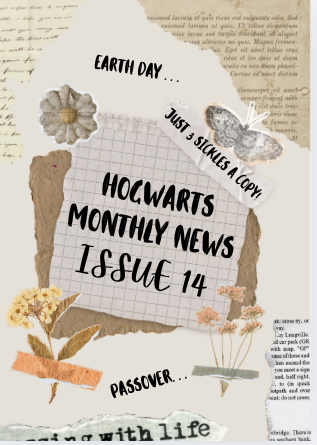Hogwarts Monthly News (Issue 14)
By Hazel Emory Antler
. . . Hey lovelies! Welcome back to another issue of Hogwarts Monthly News. April has been chill, relaxing, and quite peaceful, but many celebrations have occured! April Fools, Easter, and ANZAC Day are just a couple. Of course, we have had a couple of custom chapters made this month too, but I won't spoil anything else. Flip to the first page! (One copy = 3 sickles.)
Last Updated
May 3, 2025
Chapters
20
Reads
142
Magical Criminal Law 7 - Lysandra Jackson
Chapter 14
In the series of following articles in the coming months, magical historical criminal trials will be read through, explained, and given their outcomes.
People v Lysandra Jackson (1977)
INSTANT FACTS: During the First Wizarding War, Auror Lysandra Jackson cast the Cruciatus Curse on a suspected Death Eater, invoking Barty Crouch Sr.’s Edict, which permitted Aurors to use Unforgivable Curses during wartime operations.
BLACK LETTER RULE: Even in wartime, governmental edicts that authorize exceptions to established magical law must conform to the core protections enshrined in the Eldorian Magical Charter, including prohibitions on inherently torturous magic.
PROCEDURAL BASIS: Brought to the Wizengamot after Lysandra Jackson was brought to court based on her actions during the First Wizarding War.
FACTS: In Year Four of the First Wizarding War, tensions within the wizarding world reached a fever pitch. Death Eater attacks were rampant, and the Ministry of Magic, under increasing pressure to maintain order, granted unprecedented powers to its Auror Corps. Chief among these was Barty Crouch Sr.’s controversial Edict No. 927, which allowed Aurors to use Unforgivable Curses during field operations without prior Wizengamot authorization. Auror Lysandra Jackson, a decorated officer known for her battlefield prowess, was deployed to a raid in Knockturn Hollow. There, she captured Thaddeus Mulven, a known associate of Death Eater leader Dolohov. Upon detainment and citing urgency to locate a hidden cache of cursed relics, Jackson used the Cruciatus Curse on Mulven to extract information. The tactic worked—Mulven revealed the location of a cursed object intended for use in a large-scale Muggle attack. The raid was heralded as a success, and Jackson was initially praised. However, following the end of the war, a wave of legal challenges sought to reevaluate the wartime powers used by the Ministry. Jackson was indicted under Article 54 of the Magical Misconduct Code, which prohibits the use of inherently torturous magic, regardless of circumstances. Her defense invoked Crouch’s Edict, arguing she was acting under direct legal authority during a declared magical emergency. Prosecutors contended that no ministerial edict could supersede the Eldorian Magical Charter’s fundamental protections, particularly regarding the Cruciatus Curse’s cruel nature.
ISSUE: Is an Auror allowed to break the law, even during wartime?
DECISION AND RATIONALE: The High Wizengamot issued a split decision, ultimately convicting Jackson but recommending clemency. The majority opinion held that Crouch’s Edict, though ministerially authorized, could not override foundational legal protections in the Charter. They ruled that even in wartime, the government may not sanction inherently cruel and torturous magic without judicial oversight. The court distinguished between tactical field spells and dark curses intended to cause suffering. It concluded that the Cruciatus Curse, designed purely for pain, constituted a violation regardless of outcome or intent. The justices acknowledged the difficulty of combat scenarios but stressed that moral boundaries must remain firm, even under duress. In assessing Jackson’s culpability, the court recognized that she had relied in good faith on the legal guidance in place at the time. As such, her sentence was suspended, and she was formally pardoned after a period of probation. The decision aimed to balance accountability with fairness to those who served during chaotic times. A concurring opinion urged the Ministry to establish clearer wartime protocols that respect both magical ethics and practical realities, recommending the creation of an Emergency Legal Review Board for future crises. A passionate dissent argued that the conviction would demoralize future Aurors and questioned whether the court had imposed modern peacetime values onto wartime decisions. The dissenter believed that Jackson's actions, while harsh, were justified under the extraordinary circumstances of the war. People v. Jackson thus reaffirmed that no governmental edict can override core legal protections, even during magical warfare, and set a precedent for reviewing the legality of emergency measures enacted during times of conflict.
Written by Michael I.
Edited by Hazel Antler.
Proofread by Daphne Clarke.



